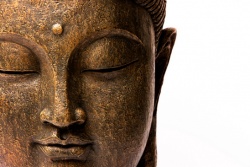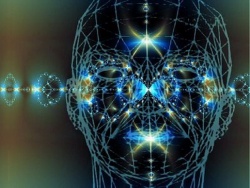Kâma Loca
Kama Kama (kaum maum), n. (Theosophy) Desire; animal passion; Note: supposed to create the kama rupa (roopa]) [Skr. rupa shape, image], a kind of simulacrum or astral likeness of a man which exists after his death in an invisible plane of being, called kama loca (loka) [Skr. loka space, world), until the impulses which created it are exhausted and it finally fades away.
THE statements already made in reference to the Destiny of the higher human principles at Death will pave the way for a comprehension of the circumstances in which the inferior remnant of these
principles finds itself, after the real Ego has passed either into the Devachan'ic state or that Unconscious intervening period of preparation therefore which corresponds to physical gestation. The
sphere in which such remnants remain for a time is known to occult science as Kama loca, the region of Desire, not the region in which Desire is developed to any abnormal degree of intensity as compared with
Desire as it attaches to Earth-Life, but the sphere in which that sensation of Desire, which is a part of the Earth-Life, is capable of surviving.
It will be obvious, from what has been said about Devachan, that a large part of the recollections which accumulate round the human Ego during Life are incompatible in their nature with the pure
subjective existence to which the real, durable, Spiritual Ego passes; but they are not necessarily on that account extinguished or annihilated out of existence. They inhere in certain molecules of
those finer (but not finest) principles, which escape from the Body at Death; and just as dissolution separates what is loosely called the soul from the Body, so also it provokes a further separation between the
constituent elements of the soul. So much of the fifth principle, or human soul, which is in its nature assimilable with, or has gravitated upwards toward, the sixth principle, the Spiritual soul,
passes with the germ of that divine soul into’ the superior region, or state of Devachan, in which it separates itself almost completely from the attractions of the Earth; quite completely, as far as its own Spiritual
course is concerned, though it still has certain affinities with the Spiritual aspirations emanating from the Earth, and may sometimes draw these towards itself. But the animal soul, or fourth principle (the
element of will and Desire as associated with objective existence), has no upward attraction, and no more passes away from the Earth than the particles of the Body consigned to the grave. It is not in the grave, however, that this fourth principle can be put away.
It is not Spiritual in its nature or affinities, but it is not physical in its nature. In its affinities it is physical, and hence the result. It remains within the actual physical local attraction of the
Earth — in the Earth’s atmosphere — or, since it is not the gases of the atmosphere that are specially to be considered in connection with the problem in hand, let us say, in Kama loca.
And with the fourth principle a large part (as regards most of mankind unfortunately, though a part very variable in its relative magnitude) inevitably remains. There are plenty of attributes which the ordinary composite
human being exhibits, many ardent feelings, Desires, and acts, floods of recollections, which even if not concerned with a Life as ardent perhaps as those which have to do with the higher aspirations, are
nevertheless essentially belonging to the physical Life, which take time to die. They remain behind in association with the fourth principle, which is altogether of the earthly perishable nature, and disperse
or fade out, or are absorbed into the respective universal principles to which they belong, just as the Body is absorbed into the Earth, in progress of time, and rapidly or slowly in proportion to the tenacity of
their substance. And where, meanwhile, is the Consciousness of the individual who has died or dissolved? Assuredly in Devachan; but a difficulty presents itself to the Mind untrained in occult science,
from the fact that a semblance of Consciousness inheres in the astral portion the fourth principle with a portion of the fifth — which remains behind in Kama loca. The individual Consciousness, it
is argued, cannot be in two places at once. But first of all, to a certain extent, it can. As may be perceived presently, it is a mistake to speak of Consciousness, as we understand the Feeling in Life, attaching to the
astral shell or remnant; but nevertheless a certain spurious semblance may be reawakened in that shell, without having any connection with the real Consciousness all the while growing in strength and vitality in the
Spiritual sphere. There is no Power on the part of the shell of taking in and assimilating new ideas and initiating courses of action on the basis of those new ideas. But there is in the shell a survival of
volitional impulses imparted to it during Life. The fourth principle is the instrument of volition though not volition itself, and impulses imparted to it during Life by the higher principles may
run their course and produce results almost indistinguishable for careless observers from those which would ensue were the four higher principles really all united as in Life.
It, the fourth principle, is the receptacle or vehicle during Life of that essentially Moral
Consciousness which cannot suit itself to conditions of permanent existence; but the Consciousness even of the lower principles during Life is a very different thing from the vaporous fleeting and uncertain
Consciousness, which continues to inhere in them when that which really is the Life, the overshadowing of them, or vitalization of them by the infusion of the spirit, has ceased as far as they are concerned. Language cannot render
all the facets of a many-sided idea intelligible at once any more than a plain drawing can show all sides of a solid object at once. And at the first glance different drawings of the same object from different points
of view may seem so unlike as to be unrecognizable as the same; but none the less, by the time they are put together in the Mind, will their diversities be seen to harmonize. So with these subtle attributes of
the invisible principles of man — no treatise can do more than discuss their different aspects separately. The various views suggested must mingle in the reader’s Mind before the complete conception corresponds to the realities of Nature.
In Life the fourth principle is the seat of will and Desire, but it is not will itself. It must be alive, in union with the overshadowing spirit, or “one Life,” to be thus the agent of that very elevated function of
Life — will, in its sublime potency. As already mentioned, the Sanskrit names of the higher principles connote the idea that they are vehicles of the one Life. Not that the, one Life is a
separable molecular principle itself, it is the union of all —the Influences of the spirit; but in Truth the idea is too subtle for Language, perhaps for intellect itself. Its manifestation
in the present case, however, is apparent enough. Whatever the willing fourth principle may be when alive, it is no longer capable of active will when dead. But then, under certain abnormal conditions, it may partially
recover Life for a time; and this fact it is which explains many, though by no means all, of the Phenomena of spiritualistic mediumship. The” elementary,” be it remembered — as the astral shell has generally been called in
former occult writings — is liable to be galvanized for a time in the mediumistic current into a state of Consciousness and Life which may be suggested by the first condition of a person who carried Into a strange
room in a state of insensibility during illness, wakes up feeble, confused in Mind gazing about with a blank Feeling of bewilderment, taking in impressions, hearing words addressed to him and answering vaguely. Such a state of Consciousness is unassociated with the notions of past or future. It is an automatic
Consciousness, derived from the medium. A medium, be it remembered, is a person whose principles are loosely united and susceptible of being borrowed by other beings, or floating
principles, having an attraction for some of them or some part of them. Now what happens in the case of a shell drawn into the neighborhood of a person so constituted? Suppose the person from whom the shell has been cast
died with some strong unsatisfied Desire, not necessarily of an unholy sort, but connected entirely with the Earth-Life, a Desire, for example, to communicate some fact to a still living person. Certainly the
shell does not go about in Kama Joca with a persistent intelligent conscious purpose of communicating that fact; but, amongst others, the volitional impulse to do this has been infused into the fourth principle,
and while the molecules of that principle remain in association, and that may be for many years, they only need a partial galvanization into Life again to become operative in the direction of the original impulse. Such a
shell comes into contact with a medium (not so dissimilar in nature from the person who has died as to render a rapport impossible), and something from the fifth principle of the medium associates itself
with the ‘wandering fourth principle and sets the original impulse to work. So much Consciousness and so much intelligence as may be required to guide the fourth principle in the use of the immediate means of
communication at hand — a slate and pencil, or a table to rap upon — are borrowed from the medium, and then the message given may be the message which the dead person originally ordered his fourth principle to
give, so to speak, but which the shell has never till then had an opportunity of giving. It may be argued that the production of Writing on a closed slate, or of raps on a table without the use of a knuckle or a stick, is itself a feat of a marvelous nature, bespeaking a Knowledge on the part of the communicating intelligence of powers
of Nature we in physical Life know nothing about. But the shell is itself in the astral World; in the realm of such powers. A phenomenal manifestation is its natural mode of dealing, it
is no more conscious of producing a wonderful result by the use of new powers acquired in a higher sphere of existence than we are conscious of the forces by which in Life the volitional. impulse is communicable to nerves and muscles.
But, it may be objected, the “communicating intelligence” at a Spiritual seance will constantly perform remarkable feats for no other than their own sake, to exhibit the Power over natural forces which it possesses. The
reader will please remember, however, that occult science is very far from saying that all the Phenomena of spiritualism are traceable to one class of agents. Hitherto in this treatise little has been said of the
“elementals,” those semi-intelligent creatures of the astral Light who belong to a wholly different kingdom of Nature from ourselves. Nor is it possible at present to enlarge upon their attributes
for the simple and obvious reason, that Knowledge concerning the elementals, detailed Knowledge on that subject, and in regard to the way they work, is scrupulously withheld by the adepts of occultism. To
possess such Knowledge is to wield Power, and the whole motive of the great secrecy in which occult science is shrouded turns upon the danger of conferring powers upon people who have not, first of all, by
undergoing the training of initiates, given Moral guarantees of their trustworthiness. It is by command over the elementals that some of the greatest physical feats of adeptship are accomplished; and it is by the
spontaneous playful acts of the elementals that the greatest physical Phenomena of the seance room are brought about. So also with almost all Indian Fakirs and Yogis of the lower class who have Power of producing
phenomenal results. By some means, by a scrap of inherited occult teaching, most likely, they have come into possession of a morsel of occult science. Not necessarily that they understand the action of the forces
they employ any more than an Indian servant in a telegraph office, taught how to mix the ingredients of the liquid used in a galvanic battery, understands the theory of electric science. He can perform the one trick he has
been taught; and so with the inferior Yogi. He has got influence over certain elementals, and can work certain wonders.
Returning to a consideration of the ex-human shells in Kama loca, it may be argued that their behavior in Spiritual seance. is not covered by the theory that they have had some message to deliver from their late master, and have availed themselves of the mediumship present to deliver it. Apart altogether from Phenomena that may be put aside as elemental pranks, we sometimes encounter a continuity of intelligence on the part of the elementary or shell that bespeaks much more than the survial of impulses from the former Life. Quite so; but with portions of the medium’s fifth principle conveyed into it the fourth principle is once more an instrument in the hands of a master. With a medium entranced so that the energies of his fifth principle are conveyed into the wandering shell to a very large extent, the result is that there is a very tolerable revival of Consciousness in the shell for the time being, as regards the given moment. But what is the nature of such Consciousness, after all? Nothing more, really, than a reflected Light. Memory is one thing, and perceptive faculties quite another. A madman may remember very clearly some portions of his past Life; yet he is unable to perceive anything in its true Light, for the higher portion of his Manas (fifth) and Buddhi (sixth) principles are paralyzed in him and have left him. Could an animal — a dog, for instance — explain himself, he could prove that his memory, in direct relation to his Canine personality, is as fresh as his master’s; nevertheless, his memory and instinct cannot be called perceptive faculties.
Once that a shell is in the aura of a medium, he will perceive, clearly enough, whatever he can perceive through the borrowed principles of the medium, and through organs in magnetic sympathy therewith; but this will not carry him beyond the range of the perceptive faculties of the medium, or of some one else present in the circle. Hence the often rational and sometimes highly intelligent answers he may give, and hence, also, his invariably complete oblivion of all things unknown to that medium or circle, or not found in the lower recollections of his late personality, galvanized afresh by the Influences under which he is placed. The shell of a highly intelligent, learned, but utterly unspiritual man, who died a natural Death, will last longer than those of weaker temperament, and (the shadow of his own memory helping) he may deliver, through trance-speakers, orations of no contemptible kind. But these will never be found to relate to anything beyond the subjects he Thought much and earnestly of during Life, nor will any word ever fall from him indicating a real advance of Knowledge.
It will easily be seen that a shell, drawn into the mediumistic current, and getting into rap port with the medium’s fifth principle, is not by any means sure to be animated with a Consciousness (even for what such consciousnesses are worth) identical with the personality of the dead person from whose higher principles it was shed. It is just as likely to reflect some quite different personality, caught from the suggestions of that medium’s Mind. In this personality it will perhaps remain and answer for a time; then some new current of Thought, thrown into the minds of the people present, will find its echo in the fleeting impressions of the elementary, and his sense of identity will begin to waver; for a little while it flickers over two or three conjectures, and ends by going out altogether for a time. The shell is once more sleeping in the astral Light, and may be unconsciously wafted in a few moments to the other ends of the Earth.
Besides the ordinary elementary or shell of the kind just described, Kama loca is the abode of another class of astral entities, which must be taken into account if we Desire to comprehend the various conditions under which human creatures may pass from this Life to others. So far we have been examining the normal course of events, when people die in a natural manner. But an abnormal Death will lead to abnormal consequences. Thus, in the case of persons Committing Suicide, and in that of persons killed by sudden accident, results ensue which differ widely from those following natural deaths. A thoughtful consideration of such cases must show, indeed, that in a World governed by rule and law, by affinities working out their regular effects in that deliberate way which Nature favors, the case of a person dying a sudden Death at a time when all his principles are firmly united, and ready to hold together for twenty, forty, or sixty years, whatever the natural remainder of his Life would be, must surely be something different from that of a person who, by natural processes of decay, finds himself, when the vital machine stops, readily separable into his various principles, each prepared to travel its separate way. Nature, always fertile in analogies, at once illustrates the idea by showing us a ripe and an unripe fruit. From out of the first the inner stone will come away as cleanly and easily as a hand from a glove, while from the unripe fruit the stone can only be torn with difficulty, half the pulp clinging to its surface. Now, in the case of the sudden accidental Death or of the suicide, the stone has to be torn from the unripe fruit. There is no question here about the Moral blame which may attach to the act of suicide. Probably, in the majority of cases, such Moral blame does attach to it, but that is a question of Karma which will follow the person concerned into the next Re-Birth, like any other Karma, and has nothing to do with the immediate difficulty such person may find in getting himself thoroughly and wholesomely dead. This difficulty is manifestly just the same whether a person kills himself, or is killed in the heroic discharge of duty, or dies the victim of an accident over which he has no control whatever.
As an ordinary rule, when a person dies, the long account of Karma naturally closes itself; that is to say, the complicated set of affinities which have been set up during Life in the first durable principle, the fifth is no longer susceptible of extension. The Balance-sheet, so to speak, is made out afterwards, when the time comes for the next objective birth; or, in other words, the affinities long dormant in Devachan, by reason of the absence there of any scope for their action, assert themselves as soon as they come in contact once more with physical existence. But the fifth principle, in which these affinities are grown, cannot be separated in the case of the person dying prematurely from the earthly principle — the fourth. The elementary, therefore, which finds itself in Kama loca, on its violent expulsion from the Body, is not a mere shell — it is the person himself who was lately alive minus nothing but the Body. In the true sense of the word he is not dead at all.
Certainly elementaries of this kind may communicate very effectually at Spiritual seances at their own heavy cost; for they are unfortunately able, by reason of the completeness of their astral constitution, to go on generating Karma, to assuage their thirst for Life at the unwholesome spring of mediumship. If they were of a very material sensual type in Life, the enjoyments they will seek will be of a kind the indulgence of which in their disembodied state may readily be conceived even more prejudicial to their Karma than similar indulgences would have been in Life. In such cases facilis est descensus. Cut off in the full flush of earthly passions which bind them to familiar scenes, they are enticed by the opportunity which mediums afford for the gratification of these vicariously. They become the incubi and succubi of mediæval Writing, demons of thirst and gluttony, provoking their victims to Crime. A brief essay on this subject, which I wrote last year, and from which I have reproduced some of the sentences just given, appeared in “The Theosophist,” with a note, the authenticity of which I have reason to Trust, and the tenor of which was as follows :
— “The variety of states after Death is greater if possible than the variety of human lives upon this Earth. The victims of accident do not generally become Earth walkers, only those falling into the current of attraction who die full of some engrossing earthly passion, the selish who have never given a Thought to the welfare of others. Overtaken by Death in the consummation, whether real or imaginary, of acme master passion of their lives, the Desire remaining unsatisfied, even after a full realization, and they still Craving for more, such personalities can never pass beyond the Earth attraction to wait for the hour of deliverance in happy Ignorance and full oblivion. Among the suicides, those to whom the above statement about provoking their victims to Crime, etc., applies, are that class who commit the act in consequence of a Crime to escape the penalty of human law or their own remorse. Natural law cannot be broken with impunity; the inexorable causal relation between action and result has its full sway only in the World of effects, the Kama loca, and every case is met there by an adequate punishment, and in a thousand ways, that would require volumes even to describe them superficially.”
Those who “wait for the hour of deliverance in happy Ignorance and full oblivion” are of course such victims of accident as have already on Earth engendered pure and elevated affinities, and after Death are as much beyond the reach of temptation in the shape of mediumistic currents as they would have been inaccessible in Life to common incitements to Crime.
Entities of another kind occasionally to be found in Kama loca have yet to be considered. We have followed the higher principles of persons recently dead, observing the separation of the astral dross from the spiritually durable portion, that spiritually durable portion being either holy or Satanic in its nature, and provided for in Devachan or Avitchi accordingly. We have examined the nature of the elementary shell cast off and preserving for a time a deceptive resemblance to a true entity; we have paid attention also to the exceptional cases of real four principled beings in Kama loca who are the victims of accident or suicide. But what happens to a personality which has absolutely no atom of Spirituality, no trace of Spiritual affinity in it fifth principle, either of the good or bad sort? Clearly in such a case there is nothing for the sixth principle to attract to itself. Or, in other words, such a personality has already lost its sixth principle by the time Death comes. But Kama loca is no more a sphere of existence for such a personality than the subjective World; Kama loca may be permanently inhabited by astral beings, by elementals, but can only be an antechamber to some other state for human beings. In the case imagined, the surviving personality is promptly drawn into the current of its future destinies, and these have, nothing to do with this Earth’s atmosphere or with Devachan, but with that “eighth sphere” of which occasional mention will be found in older occult writings. It will have been unintelligible to ordinary readers hitherto why it was called the “eighth “sphere, but since the explanations now given out for the first time, of the sevenfold constitution of our planetary system, the meaning will be clear enough. The spheres of the cyclic process of Evolution are seven in number, but there is an eighth in connection with our Earth, our Earth being, it will be remembered, the turning-point in the cyclic chain, and this eighth sphere is out of circuit, a cul de sac, and the bourne from which it may be truly said no traveler returns.
It will readily be guessed that the only sphere connected with our planetary chain, which is lower than our own in the scale, having spirit at the top and matter at the bottom, must itself be no less visible to the Eye and to optical instruments than the Earth itself, and as the duties which this sphere has to perform in our planetary system are immediately associated with this Earth, there is not much mystery left now in the riddle of the eighth sphere, nor as to the place in the sky where it may be sought. The conditions of existence there, however, are topics on which the adepts are very reserved in their communications to uninitiated pupils, and concerning these I have for the present no further Information to give.
One statement though is definitely made, viz., that such a total degradation of a personality as may suffice to draw it, after Death, into the attraction of the eighth sphere, is of very rare occurrence. From the vast majority of lives there is something which the higher principles may draw to themselves, something to redeem the page of existence just passed from total destruction: and here it must be remembered that the recollections of Life in Devachan, very vivid as they are, as far as they go, touch only those episodes in Life which are productive of the elevated sort of Happiness of which alone Devachan is qualified to take cognizance; whereas the Life from which for the time being the cream is thus skimmed may come to be remembered eventually in all its details quite fully. That complete remembrance is only achieved by the individual at the threshold of a far more exalted Spiritual state than that which we are now concerned with, and which is attained far later on in the progress of the vast cycles of Evolution. Each one of the long series of lives that will have been passed through will then be, as it were, a page in a book to which the possessor can turn back at pleasure, even though many such pages will then seem to him, most likely, very dull reading, and will not be frequently referred to. It is this revival eventually of recollection concerning all the long-forgotten personalities that is really meant by the Doctrine of the Resurrection. But we have no time at present to stop and unravel the enigmas of symbolism as bearing upon the teachings at present under conveyance to the reader. It may be worth while to do this as a separate undertaking at a later period; but meanwhile, to revert to the narrative of how the facts stand, it may be explained that in the whole book of pages, when at last the “resurrection” has been accomplished, there will be no entirely infamous pages; for even if any given Spiritual individuality has occasionally, during its passage through this World, been linked with personalities so deplorably and desperately degraded that they have passed completely into the attraction of the lower vortex, that Spiritual individuality in such cases will have retained in its own affinities no trace or taint of them. Those pages will, as it were, have been cleanly torn out from the book. And, as at the end of the struggle, after crossing the Kama loca, the Spiritual individuality will have passed into the Unconscious gestation state from which, skipping the Devachan state, it will be directly (though not immediately in time) re-born into its next Life of objective activity, all the self-Consciousness connected with that existence will have passed into the lower World, there eventually to “perish everlastingly;” an expression of which, as of so many more, modern theology has proved a faithless custodian, making pure nonsense out of psycho-scientific facts.





